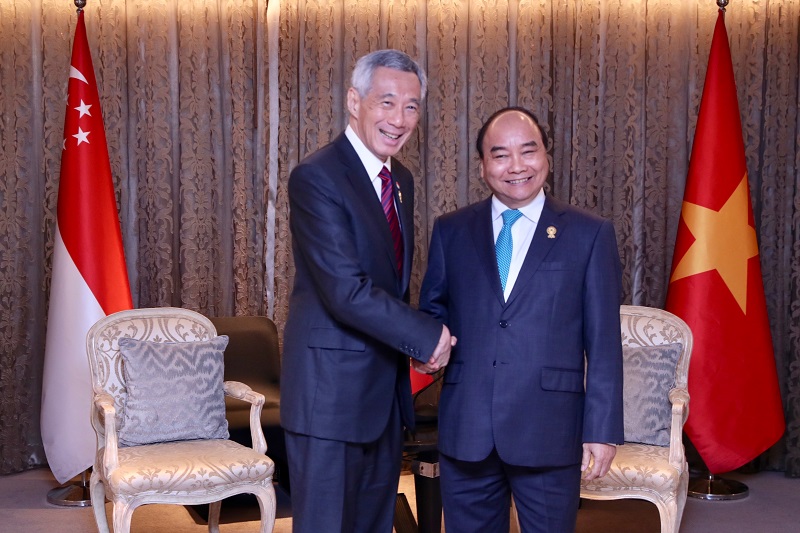Prime ministers of Vietnam and Singapore talk to keep trade flowing
Singapore remained Vietnam’s top investor despite the global pandemic.
Vietnam and Singapore have stressed the need to maintain trade among them and work with their partners to keep trade flowing amid the dwindling global network caused by health crisis.
Prime Minister Nguyen Xuan Phuc, right, and his Singaprean counterpart Lee Hsien Loong at the Asean Summit in Bangkok in June 2019. Photo: Lee Hsien Loong’s Twitter |
The two countries agreed to strengthen collaboration with a focus on the facilitation of investment and businesses during a phone talk on March 10 between the two prime ministers Nguyen Xuan Phuc and Lee Hsien Loong.
They talked over continued efforts to keep markets open and supply chains connected in the face of production resumption and the enforcement of trade agreements like the Comprehensive and Progressive Agreement for Trans-Pacific Partnership (CPTPP) and the Regional Comprehensive Economic Partnership (RCEP).
Further trade cooperation will enable the two countries to boost trade and minimize conflicts.
A number of issues of the mutual interest were also discussed in the phone talk, including the rule-based approach in the South China Sea (called East Sea by Vietnam) and substantive negotiations on a code of conduct (COC) in the South China Sea.
Trade and investment between Vietnam and Singapore have immensely grown over the last decade, forging robust bilateral relations. The ties have been much enhanced since the implementation of the Connectivity Framework Agreement in 2006, creating conducive environment for Singapore companies investing in Vietnam.
The economic cooperation is symbolized by nine Vietnam-Singapore Industrial Parks (VSIP) in Vietnam. The first VSIP in Binh Duong celebrates its 24th anniversary in 2020.
The Connectivity Framework Agreement has provided an overarching framework for bilateral economic cooperation across six sectors, including education and training, finance, investments, information technology and telecommunications, trade and services, and transportation.
Vietnam’s growing economy has offered numerous opportunities for Singapore companies. In 2020, the foreign direct investment (FDI) from Singapore topped Vietnam’s total inward inflows with nearly US$9 billion, accounting for one third of Vietnam’s total foreign investment. Major sectors of interests include manufacturing, consumer services, hospitality, food processing, infrastructure, real estate, high-tech manufacturing, finance, and technology.
Singapore’s companies working in Vietnam include Sembcorp, Keppel Land, CapitaLand, KinderWorld, United Overseas Bank (UOB), among others.
Vietnam is the top beneficiary country under the Singapore Cooperation Programme. As part of Singapore’s commitment to the Initiative for ASEAN Integration, the Vietnam-Singapore Training Centre was established in Hanoi in November 2001 to train Vietnamese officials. It was upgraded in 2019 to the Singapore Cooperation Center to boost economic integration and the adoption of technology in the region.












